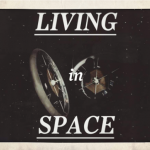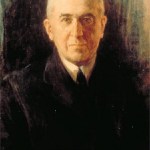Earth
In the mid-1970s, the U.S. State Department prohibited the internal use of the term "space colony," due to the global bad reputation of colonialism. Instead, the government opted for "space settlement." Of course, as Stewart Brand pointed out at the time, the last thing you do in space is settle. Quite the opposite! Making the decision to explore space -- and live there -- is just about the most unsettled act a human can commit.
There have always been two camps on this issue. First, the unsettled, like Brand: the science-fiction aficionados, capitalists, rocketry geeks, macrocosmic thinkers,…
Mushrooms and their mycelium are quiet allies that are essential for our healthy existence. They are enigmatic, have a sense of humor, and socially as well as spiritually, bond together all that admire them. They have much to teach us.
-Paul Stamets
If the ego is not regularly and repeatedly dissolved in the unbounded hyperspace of the Transcendent Other, there will always be slow drift away from the sense of self a part of nature's larger whole.
-Terrence McKenna
A few weeks ago, I was sitting at my kitchen table, having coffee, when I suddenly noticed a new development in my…
This is the first in a series of posts about art, the moon, and art on the moon. You would think this would be a fairly limited subject, but...
Art on the moon has been happening for a long time.
In 1969, a coterie of American contemporary artists devised a plan to put an art museum on the Moon. When NASA's official channels proved too dauntingly bureaucratic, Andy Warhol, Robert Rauschenberg, David Novros, Forrest "Frosty" Myers, Claes Oldenburg, and John Chamberlain weren't deterred. Instead, they managed to sneak their "museum" -- in reality a minuscule enamel wafer inscribed with six…
How old is the earth?
Short answer: 4,540,000,00/H30 Earth-years, plus or minus 1%.
Long answer: We don't know exactly because direct dating of the earliest material on the surface of the Earth will only tell use a minimum age; Prior to that, the Earth's surface was probably molten, and even after that, it may be that the earliest non-molten material has been recycled into the planet's interior by tectonic processes. Also, the earth is a big round ball of stuff that condensed into this shape from part of a large disk-shaped blob of stuff known as the Solar Nebula. When exactly, given this,…
You may have heard some hypotheses. But you may be wrong. Go here to read the most current explanation.
Our May Science Café (description below) will be held on Tuesday 5/18 at Tir Na Nog on S. Blount Street. This year there has been an incredible amount of geologic activity around the world. During this cafe we will be talking about volcanoes and earthquakes and how these and other forces have shaped North Carolina. Our café speaker for the evening will be Dr. Kevin Stewart from the Geology Department at UNC. It should be an interesting evening for all of us to learn more about the earth, how it changes, and how those changes can affect our present world. Dr. Stewart will have some of…
Our April Science Café (description below) will be held on Tuesday 4/20 at the Irregardless Cafe on Morgan Street. Our café speaker for that night is Rogelio Sullivan, Associate Director of the Advanced Transportation Energy Center and also of the Future Renewable Electric Energy Delivery and Management Systems Center (FREEDM) at NCSU. Come and learn how our country is dealing with our ever-increasing energy consumption, and of ways that we may be able to reduce our dependence on foreign oil using a combination of innovative alternative energy cars and changes in our daily transportation…
At World Science - listen to the podcast and join the online discussion:
Our guest in this Science Forum is economist Scott Barrett of Columbia University's Earth Institute. Chat with Barrett about the science and politics of geoengineering, the emerging field of science aimed at cooling the planet.
Barrett is an expert on international environmental agreements. He is currently studying the politics and economics of geoengineering. He says countries are more likely to geoengineer climate than reduce their carbon emissions. Read his paper on The Incredible Economics of Geoengineering.
Barrett…
A new forum at World Science is up. As always, listen to the podcast first, then ask questions in the forum:
This week, India rejected what would have been the country's first a genetically modified food crop, a transgenic eggplant.
The company that developed it, an Indian subsidiary of Monsanto, claims the crop would reduce pesticide use and boost yields. But the Indian government has decided to do independent assessments of the crop's potential impacts on consumer health and the environment.
What does this mean for the future of GM crops in India and elsewhere? And does this technology have…
One of things I like to think about in science is "how do we know that?" It is interesting how one thing builds on another. This is a story of how the Greeks estimated the distance from the Earth to the Sun (an important idea in the development of the model of the solar system). I like this story because it is not too complicated. In fact, one could easily reproduce these measurements themselves. So, here is what I will talk about:
Measuring the size of the Earth.
Determining the distance from the Earth to the moon and the size of the moon.
Calculating the distance (and size) to the Sun…
Boom 'n' Doom: Volcanoes, North Carolina and North Carolina Volcanoes
November 18th; Acro Café on the fourth floor of the Museum of Natural Sciences
8:30-10:00 am with discussion beginning at 9:00 followed by Q&A
Volcanic activity half a world away can affect us in our own state. When Indonesia's Mount Tambora erupted over about 4 days in 1815, the resulting debris cloud led to the "Year Without Summer" in 1816, which was marked by massive crop failures from Europe to North…
tags: moon bombing, science, comedy, humor, streaming video
This silly video was sent to me by Jared from LandlineTV. It is a comedic look at what happened when the earth sent out missiles in search of water.
Featuring Michael Antonucci, Yoni Lotan, Jaime Castillo, Emily Axford, Jared Neumark, Steve Levine, Dan Levine, and Paul Briganti.
Written and Produced by Captain Hippo. Jared is reading comments so I am sure he'd appreciate your thoughts and input.
From Sigma Xi:
Greetings everyone. Here's hoping that summer treated you kindly and that you are ready to dive back into American Scientist magazine's annual Pizza Lunch speaker series. We begin this year at noon, Thursday, Sept. 24 at Sigma Xi, the Scientific Research Society here in Research Triangle Park.
Come hear UNC-Chapel Hill chemist Thomas J. Meyer discuss efforts to develop alternative energy sources that are safer than greenhouse gas emitting fuels. Meyer leads a new research center that this year landed $17.8 million in federal funding to try to develop solar fuels and next-…
tags: science, god, religion, creationism, humor, funny, satire, Edward Current, streaming video
This video provides an unbiased look at whether Earth's favorable conditions for life prove that a loving God planned it that way all along. (Hint: There's no other explanation.) [3:45]
Today is the 130th anniversary of the birth of Milutin Milankovic, a Serbian geophysicist best known for Milankovitch cycles that describe periodicities in Earth's climate.
Vedran Vucic is in Dalj (near Vukovar, Croatia), Milankovic's birthplace, today for the birthday celebrations. He says that the house in which Milankovic grew up has been renovated for the occasion. I am assuming it has been turned into a museum. As I will go to Serbia again this summer, perhaps Vedran and I can take a trip to Dalj, where a group of science popularizers are interested in hearing about Open Access…




